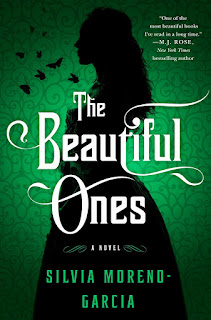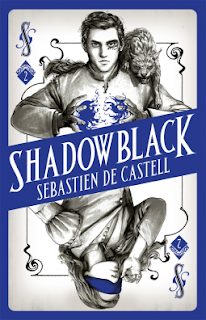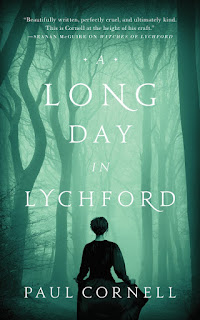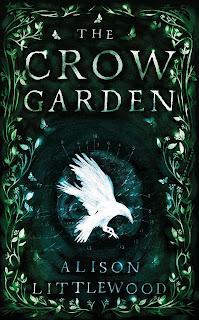Today I'm hosting the blogtour for Zoë Sharp's new book, Foxhunter, the latest adventure for her hero Charlie Fox:
Charlie Fox is sent to Iraq to find her missing lover, Sean Meyer, and her mission is clear: to find Sean Meyer and stop him. By any means necessary.
Her boss at the New York-based close-protection agency spells it out chillingly: "If he can't be reasoned with, he must be stopped …"
Zoe has very kindly answered some questions I put to her about her writing and her life. So
— over to you, Zoe!
BBB: What inspired you to write in the first place (particular books, something that happened...) —how did you get started writing?
ZS: I can’t really remember a time when I didn’t want to write. I do recall starting an awful lot more stories than I ever finished, though. I suppose there must have been some short stories, but it wasn’t until I was fifteen that I managed to sustain a plot idea to its logical novel-length conclusion. I still have that manuscript somewhere, but am determined it will never see the light of day. I’m grateful, looking back, that there was no real opportunity for self-publishing back then. Some apprentice pieces are never supposed to be widely shown to anyone.
My first experience with the publishing industry convinced me that I ought to seek an alternative way of working with words, so I started writing non-fiction instead. First came reports for a local classic car club newsletter, then articles for the classic car magazines, and then I branched out into freelance writing for the motoring press in general. I seem to remember giving up my day-job to write full-time on the strength of one accepted article and the promise of more work to come. That was in 1988. I haven’t had a ‘proper’ job since.
It was during the years I worked as a photojournalist (the photography rapidly followed the initial words-only commissions) that I received death-threat letters. They were proper cut-out-of-newspaper things, like a ransom note, telling me my days were numbered and they knew where I lived. It was scary at the time—particularly as the police never pinned down who sent them—and my way of dealing with this unresolved threat was to write through it. So, I started on the book that became KILLER INSTINCT. I finished that book in 1999, and by the following year had an agent and a publisher.
I think that in many ways it’s easier to get into writing now—anyone can start a blog, or indie-publish short stories or a novel—but in other ways it’s harder to earn a living doing so. As I said, anyone can do it, and so many people are that it’s difficult to make one voice heard among the many. The arts are an area where the quality of what you do has absolutely no bearing on how successful you might be.
BBB: ... and what did you expect from it? How did it compare with what you expected?
ZS: I supposed I hoped, like anyone, that writing would be self-sustaining. It has never been simply a job for me—it’s a compulsion bordering on obsession. The idea that I might be able to make a living doing the thing I loved best was a very attractive one. And yes, there are days when I seem to have to fight for every full-stop and comma I get onto the page, but these are balanced by the other (occasional) days when the words just flow, apparently channelled from the ether.
While the business side of things has often proved very frustrating, and the amount of criticism an author can face on a daily basis would make a rhino weep, overall I can’t envision a time when writing would not be an important part of my life. The wonderful thing is, it can be done anywhere I can plug in a laptop and access the internet. I’ve just been crewing on a yacht in the eastern Mediterranean, researching a possible book, and managed to get part of the current work written while I was out there. What’s not to love about that?
BBB: I'm always interested to ask authors if the protagonist came first, or emerged from the story. You write in the endnote to Fox Hunter that the idea of Charlie as a "tough, self-sufficient heroine" had been with you for some time—but was it any more specific than that? Did she change much as you wrote her?
ZS: The protagonist came first, definitely. Charlie Fox arrived more or less fully fledged right from the start. I sometimes joke that she walked in out of the blue one day, pointed a gun to my head and said, “I have a story to tell. You’re going to listen. And you may want to write this down …”
I remember writing the very first piece featuring her, years before I started on the first book. It was a scene of her over-reacting to a close-protection training exercise. At the time I had no idea where that scene might be going, or even quite where it had come from. Eventually it made its way, almost wholesale, into the third book, HARD KNOCKS, which is set at a bodyguard school in Germany. Charlie goes in undercover to find out what happened to a previous trainee, and has to try to play down her skill-set in the face of what proves to be overwhelming provocation.
Yes, she has changed over the course of the series—after all, FOX HUNTER is book twelve. Either you choose to let the character evolve as the series goes on, or you try to keep them forever frozen in time, like an insect in amber. I knew right from the beginning that she was going to change, and although I didn’t plan it, the books have fallen naturally into a series of trilogies as her life and circumstances have altered. The first three are her amateur period; the next three have her working for Sean Meyer’s UK-based security agency; then the following three see her and Sean working for Parker Armstrong in New York, and include major upsets in Charlie’s life. The last three have Charlie coming to terms with the aftermath of that turmoil. And, without giving any spoilers, the next book will be the start of a new period, with new challenges up ahead.
BBB: You've written a string of books now about Charlie. Do you ever find her taking over—or are you firmly in control as you write?
ZS: It’s a nice theory that writers are in control of the world we create, but in practise I find I’m usually just along for the ride. I think this is partly down to the way I plan a novel. I don’t write by the seat of my pants, but neither do I try to work out every tiny detail before I begin. I plan the main structure of the story, the dramatic high points of the plot, but I leave the reactions of the characters to those events to coalesce in a more organic fashion.
Likewise, I don’t do complicated character biographies for new characters in each book, but rather I like to leave them to introduce themselves to me on the page. Some have turned out very differently to the way I originally envisioned them—usually for the better, I hope …
BBB: Is it difficult working with a long-running series and characters?
ZS: I think the difficulties with a series are twofold. How to keep presenting fresh challenges for the protagonist is the first of these, but I suppose the same could be said of any author writing standalone crime novels. I’m always trying to think of a new take on a plot—an approach or a scenario that I haven’t explored before.
In the latest book, FOX HUNTER, Charlie’s role is more that of a detective than a straightforward bodyguard. She is trying to protect Sean, certainly, but by finding out who is really responsible for the crimes he is suspected of committing rather than putting herself physically between him and any dangers he faces. At the same time, it contains elements of the hunt the title suggests—before she can protect Sean, first she has to find him. And she’s not the only one on his trail.
The other difficulty is far more closely related to the fact this is indeed a long-running series, and that is how to present backstory in a new and engaging way. For a start, Charlie’s got history—history with Sean; history with their boss in the New York security agency, Parker Armstrong; and history dating back to when she was still in the military. I try to include a slightly different facet of the story so it will build up into a cohesive whole over a number of books.
With each instalment, I need to get all that across for the benefit of new readers, without labouring the point for people who’ve read the previous books. And in this case there’s also explaining Charlie’s relationship with recurring characters who appeared in earlier books and have popped up again now. Plus, I like to insert something in an earlier book that I know—or at least have a feeling—will come in useful at a later date. Nothing too cryptic, but a nod for those who’ve followed Charlie’s story from the beginning.
So, the brand new Honda FireBlade motorcycle Charlie receives for professional services rendered at the end of HARD KNOCKS, for example, enables part of the storyline of book five, ROAD KILL. A character in ABSENCE OF LIGHT returns to play an important off-stage role in FOX HUNTER. Something that happens in DIE EASY: book 10, will return in the next in the series, so watch this space!
BBB: I can see from Fox Hunter that there's more to come—can you drop any hints about what's next for Charlie?
ZS: Next for Charlie is a change of direction. She’s been changing over the course of the series, as we’ve already discussed, but within the world of close protection. Now she’s going to step slightly outside the safety of that zone. She’s going to move from a profession that is, by its nature, re-active, to something that’s a little more on the pro-active side. More than that, I’m not prepared to say at the moment …
BBB: The book reflects your travels in Jordan—do you normally do a lot of research (and travel!) for the books? (That sounds to me like a great perk of being a writer!)
ZS: I try to do a huge amount of research for the books … and then I try to leave as much of it as possible out of the story. Research is necessary for flavour, atmosphere, and authenticity, but at the same time I am acutely aware that I’m writing a book designed to entertain, not to lecture. It’s not supposed to be a travel guide, or a textbook. But, people love to feel they’ve been privy to trade secrets and otherwise hidden bits of detail, so those are the snippets I try to include.
Besides, there’s a limit to how much you can glean from outside sources—sometimes you are in danger of merely repeating the errors of others. Yes, you can do an enormous amount of research from books, or over the internet, but at the end of the day there’s no substitute for being there if you can make it happen.
Q: You mentioned that you have a book locked away that you wrote when you were 15. Is there any chance of it seeing the light? Or will it get the Terry Pratchett steamroller treatment? (I suppose that's a roundabout way of asking—are you on the side of those who always want to know more about the writing process, or do you think a line needs to be drawn?)
ZS: Oh, the steamroller, ever time! I love insider notes—I’m one of the only people I know who loves to listen to the director’s commentary on movies and TV episodes on DVD, and watch the making-of documentaries, but I don’t necessarily want to see all the outtakes where the actors cracked up, fluffed their lines, or tripped over their own feet. I may want to know how the magic is created, but that doesn’t mean I want it destroying before my very eyes.
BBB: Where do you stand on genre (every time I look there seem to be more of them…)—useful in writing or just a marketing label?
ZS: I’m a bit ambivalent about genre classifications, I have to confess. They’re useful as a general guide, but I think these days there are more books that fall outside the traditional boxes than are contained within them. And authors do try to stretch the definitions. Everyone wants to think they’ve written a page-turning story that is hard to put down, but that doesn’t necessarily make it a thriller in the general sense of the word. When asked this question, I usually quote the one category that caused me the most confusion: cutting-edge cosy. Anybody care to explain that one to me?
Readers do want—and deserve—to know what they’re getting, however. If you invest time and money by purchasing a book, you want the confidence before you begin that it’s going to fall within your sphere of enjoyment, on all kinds of levels. If you start reading what seems to be a straightforward police procedural about a serial killer with seemingly superhuman strength who exsanguinates his victims, you want to be able to trust that you’ll be wowed by how the criminal has been carrying out his crimes and how the detective put together the clues to catch him. You don’t want to find out at the end that the killer is a vampire and the detective used their heightened werewolf senses to hunt him down. If you wanted and were expecting a supernatural element, great. But if not …
I understand there have recently had to be more classifications for erotica, in order to make it clear to both retailers and readers what they might be getting into. Books containing certain taboo themes will find very few retailers prepared to stock them, and I can’t say I’m surprised by this. Just because you can now write and publish a book about any deviation under the sun, that doesn’t mean you should do so.
BBB: Finally, a question that isn’t (directly) about the books. You’ve stumbled into a devious plot while researching a new novel, as a result of which you’re trapped in a lonely forest tower. A rescue party is on its way but will take several days to reach you. You have plenty of food and water, and you can have one book with you. Which would it be?
A: Ooh, that’s a tricky one. Besides, I’m already off down the road of wondering what the devious plot that I’ve stumbled into might be, and what the interior of this lonely forest tower might look like or contain, and what perils the rescue party might be encountering on its way to me. And …
Anyway … one book, huh? A dictionary. Preferably a very large and comprehensive one, that not only gives the meaning of words and phrases, but their original derivations and altering usage as well. I love words in all their forms, and strolling through such a dictionary of treasures would keep me occupied no matter what obstacles were put in the path of my plucky rescuers. Maybe even long enough for my hair to grow so they could climb up into my tower? Nah, who am I kidding? Soon as their couple of days was up, I’d improvise some weaponry out of ordinary household items and fight my own way out.
Zoë, thanks for those answers, which shed a lot of light on your writing and on Charlie Fox in particular. Before I go off to ponder what "cutting edge cosy" might be (razor sharp knitting needles?) can I remind you that you can buy the book through Zoë's website (link below) or from various flavours of Amazon - and to catch the other stops on the blogtour (see poster for details).
Zoë Sharp’s criminal tendencies were predisposed when she was born in Nottinghamshire within sight of Robin Hood’s hangout in Sherwood Forest. She opted out of mainstream education at the age of twelve and blames her lowbrow sense of humour on spending far too long hanging round with mechanics. She believes life should be lived the same way as riding a motorcycle—with one knee on the deck and the throttle wide open.
www.ZoeSharp.com
 The Beautiful Ones
The Beautiful Ones









